Are laws which restrict abortion – terminating an unborn child in the womb – immoral? According to a recent campaign by Amnesty International – and an advert read by Liam Neeson, the very voice of Aslan- laws which protect the unborn child are outdated, written for another time and place. (Those who want a taste of the row that has brewed can view the original video and the parody it inspired below).
In an attempt to generate a little more light than heat, we offer he following arguments and suggest that Amnesty International is quite wrong: it is neither immoral nor irrational to restrict the practice of abortion.
 One: Philosophical arguments aside, modern science has given us remarkable insight into the developing child. Consider the child’s heart. Barely a fortnight after fertilization the heart is forming. By the next week the heart will divide into chambers and start beating. Or consider the striking images which show us that merely six weeks after conception the unborn child is recognisably human.This image of a vulnerable human being calls for a humane response. We cannot achieve social justice by deliberately dismembering innocent human beings.
One: Philosophical arguments aside, modern science has given us remarkable insight into the developing child. Consider the child’s heart. Barely a fortnight after fertilization the heart is forming. By the next week the heart will divide into chambers and start beating. Or consider the striking images which show us that merely six weeks after conception the unborn child is recognisably human.This image of a vulnerable human being calls for a humane response. We cannot achieve social justice by deliberately dismembering innocent human beings.
Two: Abortion is often justified on the grounds that an unborn child is not an individual; it is a foetus and not a baby. The foetus has no wishes, ambitions, desires or emotions: it lacks a personality. If no individual personality exists in the womb then abortion violates no one’s rights. However, we should not lazily equate personality with personhood. A human can lose their personality – while in a coma, say – yet remain a person (a personal being). All humans require, at various times and for various reasons, care, nurture and protection, being on occasion unable to fend for themselves. These needs ground universally acknowledged rights which can be applied to all: all, that is, except the unborn. Why should they be excluded?
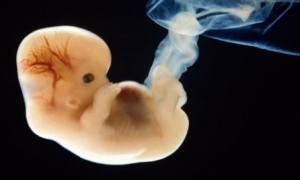 Three: It is not at all clear that the unborn child does not have a developing personality. Everyone can agree that the human personality is inextricably linked to the human body. And all the information required for the on-going development and formation of that body is already contained in the fertilised human egg. Many of our present attributes were shaped within the womb- for example, the unique features which make up your face began to form only four weeks after your conception!
Three: It is not at all clear that the unborn child does not have a developing personality. Everyone can agree that the human personality is inextricably linked to the human body. And all the information required for the on-going development and formation of that body is already contained in the fertilised human egg. Many of our present attributes were shaped within the womb- for example, the unique features which make up your face began to form only four weeks after your conception!
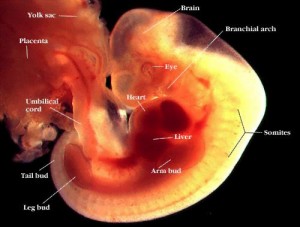 Four: We do not have rights because we have relatively high IQs or because we are psychologically complex. Rights attach to humans because of the kind of beings that humans are. Every human is born with the potential to become self-aware, rational, conscious, creative and moral which gives every human a right to protection and nurture. To clarify a pile of bricks is potentially a wall. But a pile of bricks does not fulfil its potential by becoming a wall! There is no inherent purpose to a pile of bricks – it does not have a destiny. The unborn child, however, is laden with information that drives it on to a final destination. The unborn child not a “potential life” or a “potential human”. It is a human life with the awesome potential to choose, know, love and be loved.
Four: We do not have rights because we have relatively high IQs or because we are psychologically complex. Rights attach to humans because of the kind of beings that humans are. Every human is born with the potential to become self-aware, rational, conscious, creative and moral which gives every human a right to protection and nurture. To clarify a pile of bricks is potentially a wall. But a pile of bricks does not fulfil its potential by becoming a wall! There is no inherent purpose to a pile of bricks – it does not have a destiny. The unborn child, however, is laden with information that drives it on to a final destination. The unborn child not a “potential life” or a “potential human”. It is a human life with the awesome potential to choose, know, love and be loved.
Five: Consider this thought experiment: imagine a strange and exotic virus ravages a human’s nervous system, paralysing the limbs and leaving the subject with no conscious awareness. Cells in the higher brain cease to function properly; there is no response to external stimuli. Only those brain functions essential for life (respiration, heat-beat) continue. However, further suppose this disease only lasts for a few hours. With nothing more than nine hour’s bed rest, the patient usually heals and makes a full recovery.
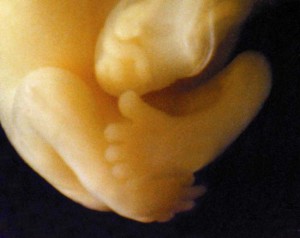 Presumably, no-one would deny that a human suffering the effects of this disease would lose their right to life. They would lose all conscious awareness and their capacity for rational thought, but not their human dignity. With a little patience and care, the potential of the human being will manifest itself once more. The person is on a path to full consciousness; they have all the capacities that give a human being inherent value. Now, change the thought experiment a little, and imagine the time it takes for recovery is nine weeks or nine months. Again, it seems we could not kill a human being simply because he is not conscious. But the unborn child is in a similar position: it would also normally develop human capacities over nine months; so it also must be worthy of care and protection.
Presumably, no-one would deny that a human suffering the effects of this disease would lose their right to life. They would lose all conscious awareness and their capacity for rational thought, but not their human dignity. With a little patience and care, the potential of the human being will manifest itself once more. The person is on a path to full consciousness; they have all the capacities that give a human being inherent value. Now, change the thought experiment a little, and imagine the time it takes for recovery is nine weeks or nine months. Again, it seems we could not kill a human being simply because he is not conscious. But the unborn child is in a similar position: it would also normally develop human capacities over nine months; so it also must be worthy of care and protection.
Fifth: You are a human organism now, and you were a human organism at the moment of your conception. The cells of the embryo divided and differentiated, but the organism survived and thrived. It would be utterly absurd to claim that you were not the same organism, the same individual. To murder you now would be to deprive you of your human dignity and your future life. We would have deprived you of the same rights if we had killed you when you were a child, or a neonate. How could it be otherwise? You were the same individual human being at every stage. To have killed you before your birth would have been to deprive you of a greater part of your future. So, before you were born you had at least the same right to life as your adult self. Of course, you have no more inherent dignity than the next human; so every human has exactly the same right not to be murdered before he or she is born.
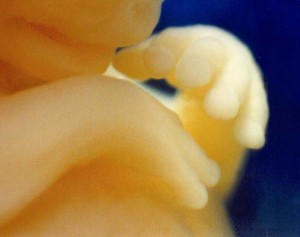 Six: There is a great danger in supposing that we do not have rights until we become conscious and self-aware. A new born child is less rational than a dog or a pig; are we to infer that it has less moral value? Or could we seriously suggest that a newborn child only obtains human dignity once it is accepted by its family? Furthermore, the doctrine of equal human worth is called into question if our rights depend on how far our capacities have developed. Some of us are more reflective and rational than others. And, if our rights depend on the degree of rationality or self-awareness that we have obtained, it would seem that some of us have a greater claim to fundamental human rights than others.
Six: There is a great danger in supposing that we do not have rights until we become conscious and self-aware. A new born child is less rational than a dog or a pig; are we to infer that it has less moral value? Or could we seriously suggest that a newborn child only obtains human dignity once it is accepted by its family? Furthermore, the doctrine of equal human worth is called into question if our rights depend on how far our capacities have developed. Some of us are more reflective and rational than others. And, if our rights depend on the degree of rationality or self-awareness that we have obtained, it would seem that some of us have a greater claim to fundamental human rights than others.
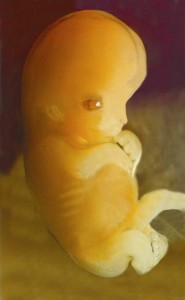 Seven: Abortion does not give women equality and freedom with men. Wouldn’t this imply a negative view of both pregnancy and motherhood? And how can true equality be achieved through violent intrusive means if men never need to access such a procedure? In fact, it seems that some abortion rights activists unwittingly view the wombless male body as normative. Legal scholar Erika Bachiochi argues that “while abortion has freed men further from the consequences of the potentially procreative sexual act, women must act affirmatively—and destructively—if they are to imitate male reproductive autonomy.”
Seven: Abortion does not give women equality and freedom with men. Wouldn’t this imply a negative view of both pregnancy and motherhood? And how can true equality be achieved through violent intrusive means if men never need to access such a procedure? In fact, it seems that some abortion rights activists unwittingly view the wombless male body as normative. Legal scholar Erika Bachiochi argues that “while abortion has freed men further from the consequences of the potentially procreative sexual act, women must act affirmatively—and destructively—if they are to imitate male reproductive autonomy.”
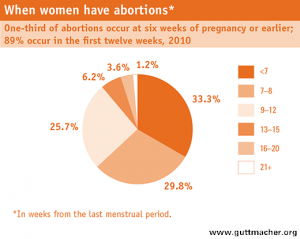 If our action brings a vulnerable, dependent human being into the world then we have an absolute duty to protect that human life. So law and culture should not allow men to escape the predictable consequences of their sexual activity. And policy and culture can create a society less inhospitable to motherhood. An isolated parent cannot raise a child. Society has a duty to assist every family. Social and financial safety nets can and should be provided. The law can insist that a person be able to exit the workforce to raise a child and later re-enter without losing gains they have made professionally. Employers should place more value on the skills which are gained through parenting; they should not penalise anyone for delaying a career to begin a family.
If our action brings a vulnerable, dependent human being into the world then we have an absolute duty to protect that human life. So law and culture should not allow men to escape the predictable consequences of their sexual activity. And policy and culture can create a society less inhospitable to motherhood. An isolated parent cannot raise a child. Society has a duty to assist every family. Social and financial safety nets can and should be provided. The law can insist that a person be able to exit the workforce to raise a child and later re-enter without losing gains they have made professionally. Employers should place more value on the skills which are gained through parenting; they should not penalise anyone for delaying a career to begin a family.
